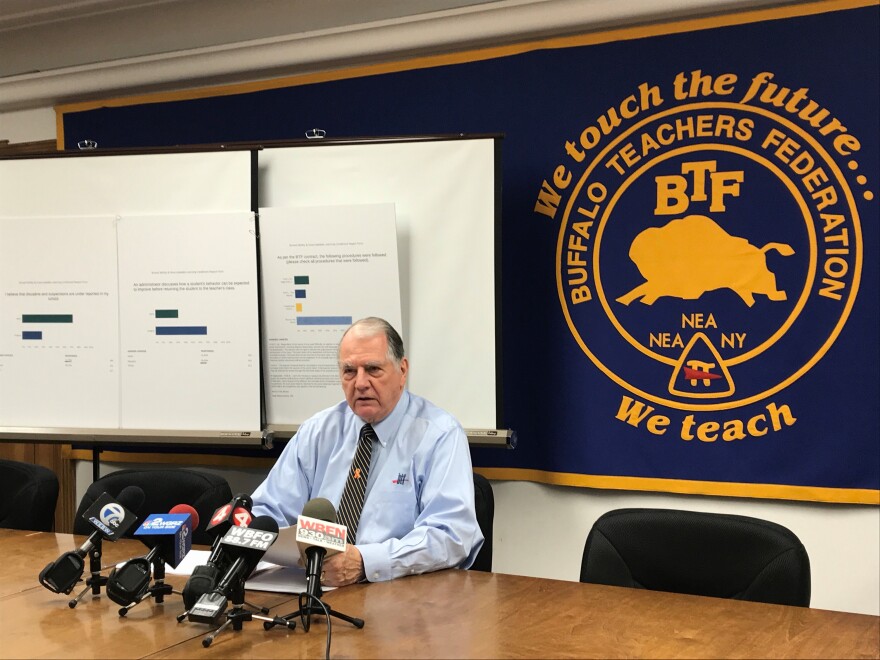The Buffalo Teachers Federation released a new survey Friday that found that four out of five Buffalo teachers polled believe disruptive student behavior is leading to “unacceptable learning conditions.”
BTF President Phil Rumore shared the survey’s main findings at a press conference Friday morning.
“What we have found is that 83% of teachers responded that disruptive student behavior was leading to unacceptable learning conditions,” Rumore said, “7.7% felt that the behavior in their school was out of control.”
About 72% of respondents also said they believe student discipline and suspensions are underreported at their schools, and the full survey results include detailed allegations of dozens of such incidents. The allegations are broken down by school, with some explicitly naming the administrator in charge.
Just 17% of respondents said disruptive student behavior is “dealt with quickly and appropriately.”
“There seems to be a cover-up going on in the schools as it relates to students’ disruptive behaviors,” Rumore said. “They’re not being reported and they’re not being addressed.”
That’s a charge district officials denied Friday afternoon.

“Absolutely not,” said Dr. Fatima Morrell, associate superintendent for culturally and linguistically responsive initiatives. “I think that’s a pretty loaded charge to accuse our good administrators and in many cases our great teachers, who are working closely with the administrators, of a cover-up.”
Seven hundred and forty-nine teachers responded to the BTF survey out of a total of 3,800 in the district. That means respondents account for less than a quarter of Buffalo’s teachers, but Morrell said the district will still take the results seriously.
“I think it’s very important that we listen to these voices and understand and come to the table to say, ‘Okay, maybe we could do a better job at that. We haven’t been doing so well, let’s do better.’”
The BTF is calling for automatic intervention services by a school counselor or social worker every time a student is suspended, “so that we can work with the student and the family to find out what caused that so it doesn’t occur.”
Dr. Morrell and Dr. Tonja Williams, associate superintendent for student support services, said, ideally, they want the same thing.
“Let’s work together and really think about ‘How do we move our kids to the next level?’ Because we know that there are some just explosive numbers around suspensions—[and] for children of color in particular,” Morrell said.
Williams added that Buffalo Public Schools is committed to implementing restorative justice measures to repair harm caused by disruptive student behavior and to counter disproportionate suspension rates for African American and Latinx students compared to their white peers.
“The resolution [to an incident] may not necessarily be what the teacher would want that resolution to be. It may be that there’s a parent conference in lieu of suspension. It may be that the counselor at the school has had an opportunity to do an intervention with the student,” she said. And even though the teacher may not like the outcome, “the principal has [a view of] the bigger picture.”
Rumore said suspensions are still necessary for some behavior and that teachers haven’t received adequate training in restorative practices. Williams responded that the district has already trained more than 2,500 teachers, along with every school leader, and that they will continue to provide ongoing training.
Superintendent Dr. Kriner Cash also released the following statement Friday:
“Suspensions are a function of behavior. Behavior is a manifestation of what is going on in a child’s life. 90% of our students have extraordinary needs including trauma, depression, anxiety, and other health issues. All of us are part of the solution to helping our students grow into healthy adults—parents, students, teachers, staff, community. To this end, as an essential part of the Education Bargain, the District is providing an extraordinary array of services and supports for all of our students and an extraordinary menu of professional development for all of our staff, including teachers.”




